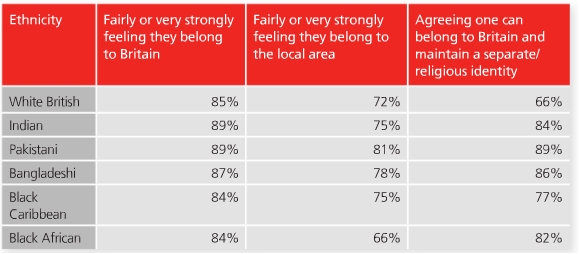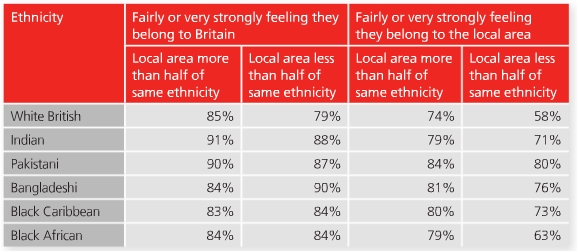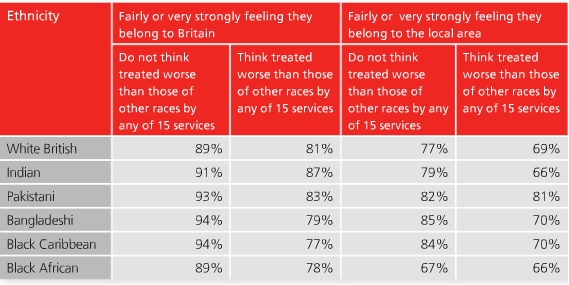 David Cameron’s speech on immigration today warns of a ‘discomfort and disjointedness’ in communities with large immigrant populations. This speech, along with his earlier comments in February that “State multiculturalism” has been a failure, signal a new hardening of policy towards immigration and migrant communities by government. However, recent research by Alan Manning has found that separation between communities does not in fact create a feeling of alienation amongst migrant groups. The greatest failing of multiculturalism, is not that it has failed to create a sense of belonging among minorities, it is that the multicultural project has paid too little attention to how to sustain support among the white population.
David Cameron’s speech on immigration today warns of a ‘discomfort and disjointedness’ in communities with large immigrant populations. This speech, along with his earlier comments in February that “State multiculturalism” has been a failure, signal a new hardening of policy towards immigration and migrant communities by government. However, recent research by Alan Manning has found that separation between communities does not in fact create a feeling of alienation amongst migrant groups. The greatest failing of multiculturalism, is not that it has failed to create a sense of belonging among minorities, it is that the multicultural project has paid too little attention to how to sustain support among the white population.
Not long ago Angela Merkel expressed the view that multiculturalism in Germany has been an “utter failure”. As recently as last December, an Iraqi-born Swede with links to Luton in the UK blew himself up in Stockholm in a failed attempt to kill others, and articles in the British press opined that his journey to extremism was aided in part by “multiculturalism”. A certain smug satisfaction that the UK had been relatively successful in building a multicultural society has turned to dismay expressed from all parts of the political spectrum as some young Britons turn suicide bombers. But is this assessment correct? My research suggests it is not.
First, let us try to understand the most important features of multiculturalism. I think it is fair to say that the essence of multiculturalism is the idea that, if one makes immigrants feel welcome by allowing them to retain their culture and by seeking to address discrimination against them, immigrants will reciprocate by embracing a British identity and the values needed for a harmonious society. In 1966, the then home secretary, Roy Jenkins, said:
I do not regard [integration] as meaning the loss, by immigrants, of their own national characteristics and culture. I do not think that we need in this country a ‘melting pot’, which will turn everybody out in a common mould, as one of a series of carbon copies of someone’s misplaced vision of the stereotyped Englishman… I define integration, therefore, not as a flattening process of assimilation but as equal opportunity, accompanied by cultural diversity, in an atmosphere of mutual tolerance.
(It is a quote that, while showing respect for other cultures, also shows its age by its neglect of women, the Scottish, Welsh and Irish.)
Why did anyone ever think multiculturalism was a good strategy? Often now, it is thought to be the product of cultural relativism, a reluctance to claim that some value systems are superior to others, so it would be wrong to insist on immigrants changing their values. But, there was another, more muscular argument for multiculturalism, namely that the values underpinning liberal democracies are very appealing to all people from whatever background. In this way, immigrants from different cultures will come to adhere of their own volition to the values that matter for the smooth functioning of society, while perhaps choosing to keep their particular cultural practices relevant only in private. From this perspective, forcing immigrants to change their behaviour risks being counter-productive – better a society of volunteers than conscripts.
One interpretation of what has happened in Britain and other countries is that there has been a failure of confidence in the universal appeal of liberal democratic values. This confidence has been replaced by the feeling that some immigrant groups (and their British-born descendants) either have no intention to integrate or that the process is happening too slowly. It is inevitable that events like the 2005 London bombings attract attention, but are the extremists behind them representative of the population as a whole? In spite of the fact that many commentators have very strong views on the subject, we have remarkably little large-scale quantitative evidence on the factors associated with feeling a part of society. Our research uses data from the England and Wales 2007 Citizenship Survey to shed more light on the identity and values of different communities in the UK.
Identity and ethnicity
A lot of concern about multiculturalism is related to the belief that some ethnic and religious minorities do not think of themselves as British, subscribing to some other identity. But much of this seems to be exaggerated.
Table 1: Percentages reporting a British National Identity by Ethnicity

The first column of Table 1 shows the fraction of different ethnic groups who report that their national identity is British. Essentially, all the “white British” do, but the percentages are lower for those from ethnic minorities. However, most of this difference has a simple explanation: the foreign-born are much less likely than the UK-born to report a British national identity and ethnic minorities are more likely to be foreign-born. The second column of Table 1 shows very modest differences between whites and non-whites for the UK-born. And it is also worth noting that the pattern of variation across the minority communities is perhaps not what one might expect e.g., the overwhelmingly Muslim Pakistanis and Bangladeshis do not stand out as having much lower levels of British national identity.
Responses to questions about national identity may be very legalistic, with many respondents saying they are British simply because they have a British passport. But the Citizenship Survey also asks more subjective questions about whether one feels that one belongs to Britain. Table 2 contains responses to some of these questions.
Table 2: Sense of belonging by ethnicity

Perhaps the most striking feature of the first two columns is that ethnic minorities show very similar levels of belonging, both to Britain and their local area, as do the white British. One could interpret this as saying that Britain has been relatively successful in making ethnic minorities feel a part of society, or that Britain has failed to sustain a high sense of belonging among the majority white community. There could also be elements of truth in both of these statements. For the ethnic minorities it is fairly clear that one reason they feel they belong to Britain is that they feel no conflict between their cultural and religious identity and being a full part of British society – the third column shows that 80 to 90 per cent of ethnic minorities perceive no such conflict. Again, there is no evidence that the Muslim communities perceive more of a conflict than others. But the third column also shows that one-third of the white British do not accept one can belong to Britain while having a minority religious or cultural identity.
Although Table 2 shows a generally high sense of belonging, there are clearly some people who do not feel they belong and our research investigated the factors which seem to be associated with a sense of belonging.
Belonging and segregation
Concern is often expressed about residential segregation, about communities becoming isolated when living apart from others. Table 3 shows the sense of belonging for those who live in areas where more or less than half are of the same ethnicity as the respondent.
The first two columns of Table 3 show that the ethnic composition of the local area seems to make little difference to the sense of belonging to Britain. The last two columns show it seems to have more effect on the sense of belonging to the local area, although only for some ethnic groups, notably the white British. Overall residential segregation seems to play little role in affecting the sense of belonging.
Table 3: The effect of residential segregation and sense of belonging

Belonging and respect
One factor that is very important is being treated fairly and with respect. People of all ethnicities are much more likely to report feeling that they belong if they feel treated fairly and with respect. The Citizenship Survey asks respondents whether they feel they would be treated better or worse than people of other races by 15 public services, covering health, education, criminal justice, local government and housing. Table 4 shows that those who think they would be treated worse by at least one of these services are much less likely to feel they belong either to Britain or to their local area.
Table 4: The effect of perceived discrimination on the sense of belonging

Conclusion
We interpret these findings as lending support to the key ideas behind multiculturalism – that making immigrants and their cultures feel welcome and respected and fighting discrimination, without worrying too much about where minorities choose to live, will result in those minorities coming to feel part of Britain. Our other research also shows that these same factors are associated with having more pro-social values. The fear that the separation between communities might be creating alienation does not appear well-founded.
But there is one important aspect in which multiculturalism has failed. While the multicultural project may be the right way to make minorities feel a part of the wider society, it pays little or no attention to white natives, taking their identity and values for granted. But our findings indicate that segments of the white population have come to feel that they are neglected and discriminated against, and do not feel a part of British society. It is not too much of a leap to imagine that this is the segment of the population from which the BNP draws its support.
So, the biggest failure of multiculturalism is not that it has failed to create a sense of belonging among minorities but that it has paid too little attention to how to sustain support among parts of the white population, who are sceptical about the ability to retain a minority ethnic or religious identity while being British and who perceive conflict over resources (especially access to social housing) with immigrants and ethnic minorities. Addressing these concerns is what needs to be done if Roy Jenkins’ ambitions for equal opportunity and cultural diversity to thrive in an atmosphere of mutual tolerance are to become anything like reality
This article first appeared in the Spring 2011 issue of LSE Research Magazine.
Please read our comments policy before commenting.







There is as. as ever, a perniciousness to this ‘debate’ for want of a better word, although I don’t ever recall there being an open and honest debate on it. likewise with immigration too. It seemed that with immigration, there was the PC trendy liberal brigade, who are all for it, and the ultra right who seem to be all against it. Those in the middle, the reasonable majority have been silenced for fear of being called racist. In the ‘argument’ that has been fostered for over decade, quite simply there was ‘no wiggle room’. It was all extremes, because if you silence reasonable people, whatever their view. all you get is extremes, feeding off each other, and sadly polarising each other. Not democracy, by a long chalk.
The problem with multiculturalism and diversity is the same. No one has really been consulted about it, nor was there ever an honest and open debate either. So assumptions and presumptions take the place of any truth, as per usual. Also, might I add, often the biggest proponents and ‘supporters’ of multiculturalism, integration in short, are usually affluent white middle class people who tend to live in mostly affluent all white areas, who have often got away from poor areas. Isn’t there a little irony in those people going on about integration when they as a class are segregating from others, mostly in an economic fashion? But that is an aside.
I am a white working class person with a fairly decent education and a fairly good grasp of politics, and I myself won’t deny that some white working class people are racist and hostile to immigrants. But in the media, the mores and prejudices are gone over with a fine tooth comb, whereas the mores and prejudices of ethnic minorities are downplayed, and certainly the mores and prejudices of the white middle class are virtually ignored in the mainstream media. The white working class are usually portrayed as chavs, racist and anti immigrant, all lumped together as an amorphous mass of people with no intellect or individuality, whereas white middle class are seen as free thinking, liberal, educated and as individuals in their own right. The portrayal of white working class people now is exactly the same way racism manifests itself, portraying people as having, usually negative, characteristics merely because they are defined, by others or themselves, as working class. Indeed, much of the promotion of black rights, women’s rights, gay people’s rights and so on, has been in some kind of way at the expense of the white working class. This is done very cruelly, subtly and perniciously, but it is there. The promotion of one small minded prejudice, which is a class prejudice, to challenge other prejudices. No one talks about that, either. Many white middle class people won’t admit that they are part of this class prejudice, and until that is accepted, we will all go around in ever decreasing circles. Our democracy, as it is, tends to be run by white, male, middle and upper middle class, privately educated men from affluent backgrounds centred on London and the South East of England. It might be that instead of going on about everyone’s rights, we begin the challenge the idea that only white middle and upper middle class people define and control the debate and seem to do the talking for everyone else.
I find that multirace in general has worked.Many immargrant s have enriched our culture BUT many have not.
There is a significant threat from a large number of muslims to all other cultures.The greatest weakness the west has is its tolerance of the intorable .
The west must stop arse kissing the Middle East and its oil money.We need a strict polocy of exact mirror image policies against islam if no christianity – Jews – Hindus – Budists ect are not allowed in muslim countries un hindered then no muslims allowed here . No mosques etc.
there appears to be no major issues between any of the worlds religions except for islam which has trouble where ever it rises with everybody else.
Would have been interesting to segment on mixed race people.
I dont like how this is titled. First you talk about multi-cultural but then wonder about losing support amongst the so called white population.
The so called white population dont consider themselves the white population. They regard themselves as British, or an other UK national identity. All those identities are juxtaposed against non British identities which because of multi-culturalism are equated as equal to the British identity in Britain.
Unfortunately by then introducing the “white” argument you move it to a question racism.
Thats regrettable because many opponents of multi-culturalism believe you can be British and with any ethnic background but you cant be British while simply continuing in your own cultural bubble refusing to be part of society.
I suspect that the non-white population interpreted the questions via the theme ‘do we have a right to be here?’. I suspect that the white population interpreted as ‘do *they* have a right to be here?’. That would give the results a very different significance.
Hi Karamat,
As my final paper is about multiculturalism in UK and besidfe the fact you live in UK you also concentrated on multiculturalism and diversity, i would like to get in touch with you.
HI Madalina,
I am currently studying multiculturalism for my A-Levels. Ive seen you’ve studied it for your final piece, would there be any chance you could help me out or send me any material? anything would be great!
Thankyou.
you may like to follow up some of my work as a pakistani immigrant on the white working class